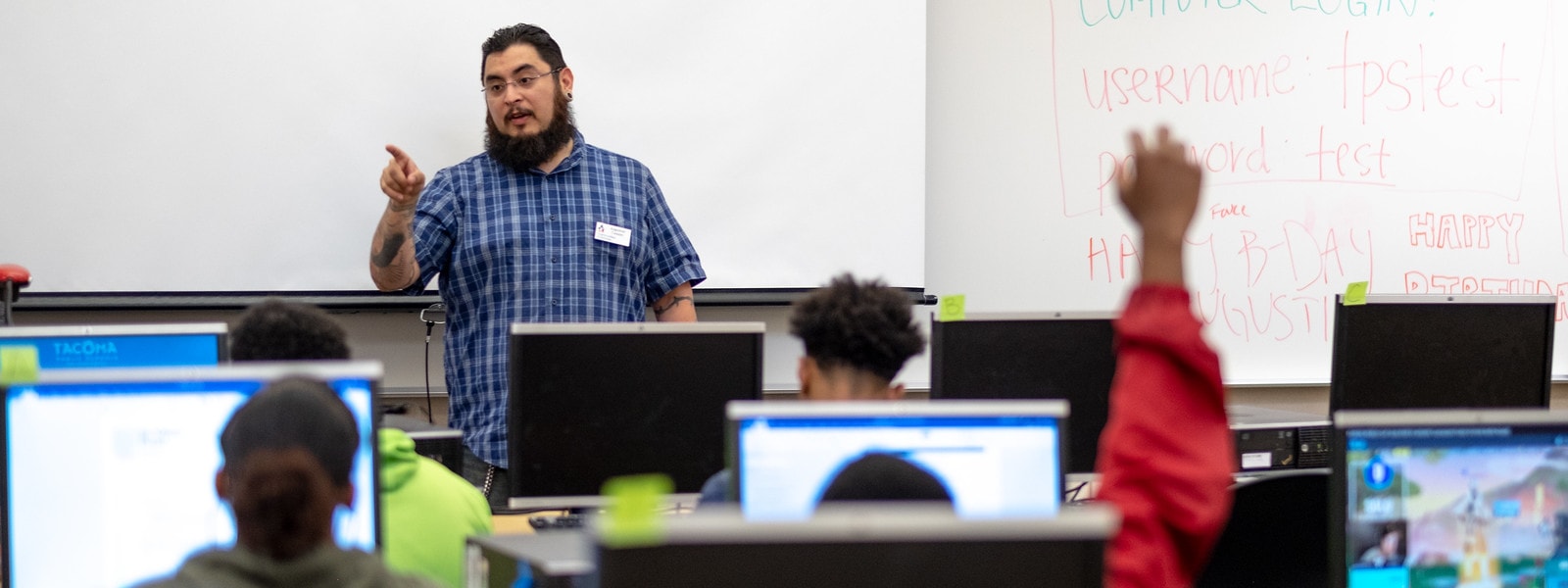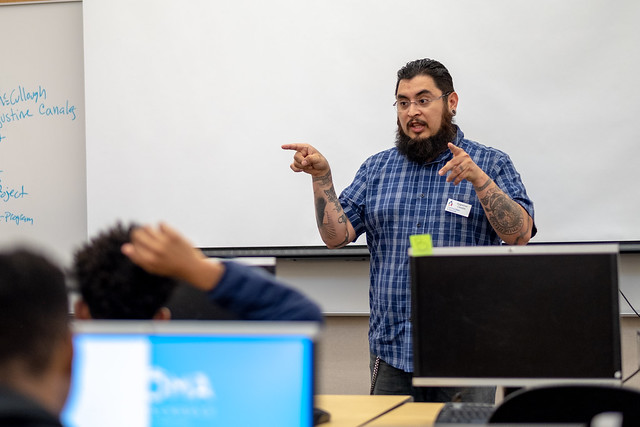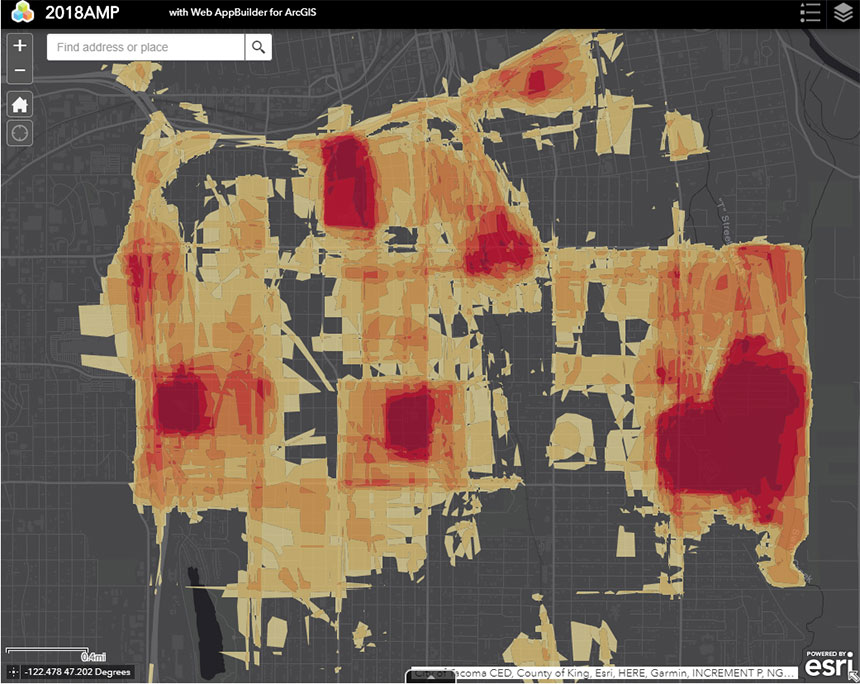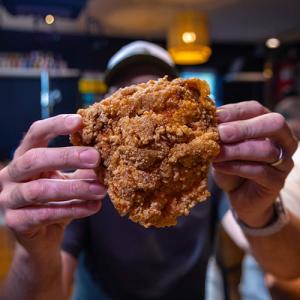
Augustine Canales: Something to Offer
As a kid, Augustine Canales didn't want to be anything. The UW Tacoma student is now a teacher, student, father and soon to be college graduate.

College was never a part of the plan for Augustine Canales. “I didn’t want to be anything when I was a kid, I just grew up,” he said. “I was in and out of juvenile hall and joined a gang — education and the traditional class structure didn’t really click for me at the time.”
At 16, Canales began a career in carpentry by joining a union. “It was good money, and you didn’t need to have an education,” said Canales. “I didn’t graduate from high school and instead got my GED when I was about 15 or 16, so it was perfect at the time.” This was when he met his wife, Mindy Canales, who has been by his side for 15 years. “I completely changed after I met my wife. She showed me that I had something to offer to the world,” he said.
For a while, all was well. Then, on his 26h birthday, Canales was diagnosed with multiple sclerosis. “I was almost on full disability, having to take a lot of medications and sitting at home all day not doing anything, which was really frustrating,” said Canales. “Throughout the whole process, my wife was a real inspiration to me. Despite my sickness she supported and encouraged me, and for a while was the sole breadwinner, taking care of me and our three kids — she always believed in me even when I didn’t believe in myself.” From there, Canales decided to return to education and registered for courses at Pierce College. “It felt like a natural transition for me,” he said.
After two years at Pierce, Canales came to UW Tacoma through the direct transfer program which he said was a “no-brainer” when it came to his academic journey. Canales chose social welfare as his major but he also had an interest in Geographic Information Systems (GIS). “My first quarter here I started taking GIS classes without really knowing what it was, and at first I thought I had made a huge mistake because we started out learning a lot of basic computer science,” he said. “Collecting the data is really what made me fall in love with the program because I could see what a benefit it could be for addressing issues within communities. It’s extremely relevant to social work too, and helped me to learn about that from a different angle.”
Learning on the job can have a huge impact, which is exactly what Canales is doing as a part of the Action Mapping Project (AMP), which, for him, has bridged the gap between social welfare and GIS. “I initially joined up to do my capstone because I realized that working with AMP had a social services aspect that I really liked due to my background in social welfare,” he said. Partnering with local middle and high schools, the project’s mission is to understand the “lived experience, knowledge, and insight of youth” within their neighborhoods. “We’re essentially mapping youth experience to understand how we as a community can make it easier for them to use their space,” said Canales. “We went to Stewart Middle School, First Creek Middle School, Giaudrone Middle School, and Lincoln High School [all part of Tacoma Public Schools], where we brought in blank maps and asked questions about their everyday lives such as where they spend their time outside of the home, their preferred routes to and from school, and where they avoid. We then created heat maps from their responses to provide that information to the City of Tacoma.”

Directed by Dr. Matthew Kelley of the UW Tacoma’s Urban Studies Program, AMP has been underway for about two years. “Dr. Kelley has been such an inspiration to me in this program,” said Canales. “What he’s doing is so important, and while technical, it’s extremely social too, and has the possibility for real social change. He brings the people who need help to the table so that we’re working with them, rather than on a ‘problem’.”
Another facet of AMP has to do with educating high school students about basic GIS skills, which Canales teaches in an after-school program at Mt. Tahoma High School (also in Tacoma).
When Canales isn’t busy with coursework, internships, or spending time with his family, he’s volunteering. “For a long time I wasn’t involved with the community, but now, because of my experiences at UW Tacoma, I see these opportunities to volunteer and make a difference,” he said. “I want to give back and not just take away.” Canales is currently an officer in UW Tacoma’s GIS Society, the vice president of the Student Social Work Organization, and a member of the social work-oriented Phi Alpha Honor Society. “My passion in pursuing social welfare and GIS ultimately has to do with my passion for social change for the better,” he said. “It’s important to be a part of the community versus just being around the community.”
Following graduation Canales plans to take the summer off to enjoy the accomplishment of a Bachelor's degree — but his journey in academia doesn’t end there. “I’m going to be applying to the master’s programs in GIS and social work here at UWT,” he said. “Eventually I’d like to pursue a Ph.D. in Social Welfare, and I believe that GIS would be a great benefit in my own learning and work with a dissertation.”
Recent news
Main Content
Educated Palate
Main Content
Lawless Honored with Governor’s Student Civic Leadership Award
Main Content
Towards the Functional Characterization of All Human Genes
UW Tacoma in the News
Main Content
Minnesota adoptees respond to fraud reports in South Korean adoption programs
Main Content
What’s next for The Swiss? Upcoming workshop to tackle how to best use iconic site
Main Content
Local Leaders Recognized at UW Tacoma’s Business Leadership Awards
Contact Information
- Phone: 253-692-5880
- Email: uwturban@uw.edu
- Urban Studies, School of (directory)



